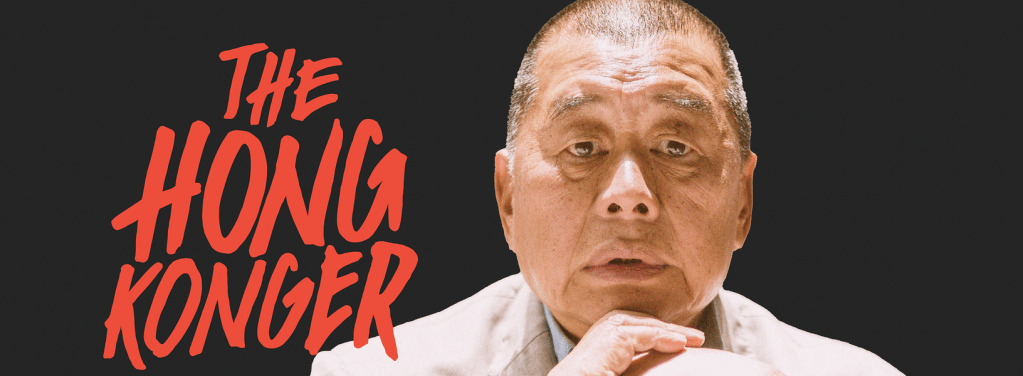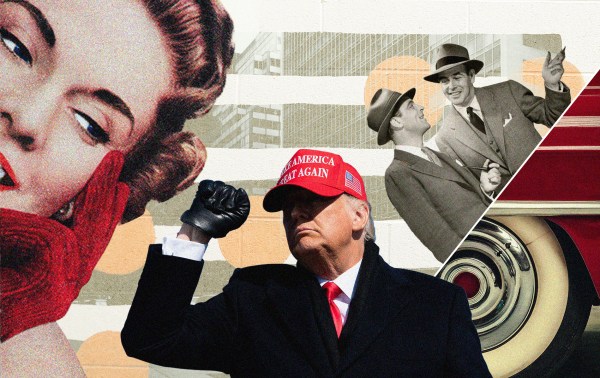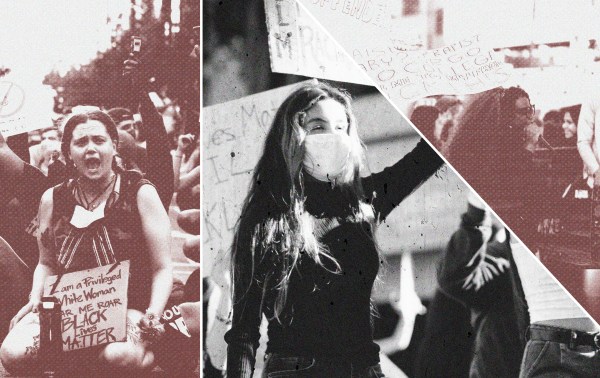One of Hong Kong’s most prominent defenders is in a Chinese maximum security prison, sitting in 35-pound shackles in solitary confinement. His story, however, is being brought to the world courtesy of the Acton Institute’s recent film, The Hong Konger: Jimmy Lai’s Extraordinary Struggle for Freedom, which follows business tycoon Jimmy Lai (Lai Chee-Ying) from his flight from mainland China to his entrepreneurial success and rise to becoming one of Hong Kong’s most outspoken advocates for democracy and the free market.
Lai came from humble beginnings, leaving his hometown of Guangzhou and stowing away on a boat to Hong Kong in 1959 during the Maoist Revolution. Arriving in Hong Kong at 12, Lai worked his way from being a child laborer in a garment factory to an owner, creating an international clothing company, Giordano, by his twenties. Lai’s capitalist ventures made him an affluent businessman, but his goals were never limited to selling Asian fashion. Since the 1989 Tiananmen Square massacre, Lai had been a voice for democracy, creating a publishing house for pro-democracy media, including Next Media in 1990 and Apple Daily in 1995, a publication that would become one of the country’s most popular. These endeavors forced him to sell Giordano under pressure from Beijing.
In 1997, the United Kingdom returned Hong Kong to China, under the agreement that Hong Kong would be free, enjoying benefits such as freedom of speech and fair trials, for 50 years. The documentary includes footage of this agreement, in which China and Hong Kong began operating under the ‘one country, two systems’ policy. This freedom would prove short-lived, however, with the passage of the National Security law in June of 2020. The law enumerated four specific crimes—secession, subversion, terrorism, and collusion with foreign governments—and enables the CCP to extradite suspects to mainland China for prosecution, signaling the end of the ‘one country, two systems’ policy.
For Jimmy Lai and millions of his fellow Hong Kongers, it showed that the CCP was willing to use force to crack down on the growing pro-democracy protests in Hong Kong, sparked by a 2019 extradition bill proposed in Hong Kong that had raised concerns similar to those under the National Security law. One such pro-democracy activist is 26-year-old Sunny Cheung, a Hong Kong expatriate who worked with Lai and participated in numerous student protests, both the 2014 Umbrella Revolution opposing electoral restrictions in Hong Kong and pro-democracy protests in 2019-2020, before leaving Hong Kong in August of 2020. Cheung told The Dispatch about his journey to becoming an activist at 14 years old. “No parent really wants their son or daughter to become an activist. We all know that the CCP is wrong; however, it’s another story to confront the CCP, you can lose your career. We just wanted to stand for what is right, like democracy and liberty,” said Cheung. “As a teenager, I cared less about what my parents thought,” he noted with a chuckle.
Cheung met Jimmy Lai in Washington D.C. in 2019, later connecting with him at Lai’s Hong Kong mansion, where the businessman met regularly with young activists. “He’s so inclusive,”’ Cheung noted. “He saw that I was the voice of a young leader.” Cheung would go on to describe being at the front of a student protest in November 2019, where police deployed pepper spray on protesters and Cheung watched fellow protesters be hit with teargas and rubber bullets. Even when Cheung made the decision to leave the country on August 15, 2020, he said he wasn’t out of danger. “The morning when I left, I was followed and harassed” by police with an arrest warrant issued under the National Security Law. Cheung has since testified at U.S. congressional hearings and, as of 2021, applied for asylum in the United States.
Lai’s work also attracted American visitors to Hong Kong. One of those visitors was Fr. Robert Sirico, president of the Acton Institute and producer of The Hong Konger. Meeting Lai, Sirico told The Dispatch, was an unforgettable experience. “I sat down with Lai and hit it off immediately,” said Sirico. “He’s very much a businessman, he had that quick entrepreneurial mindset. His demeanor is very working-class for someone who’s that wealthy. His mind is very diverse, he’ll jump from religion to economics in a second. He’s mainland Chinese, which is a different culture from Hong Kong, but he keeps you on your toes.” When asked to draw an American comparison to Jimmy Lai, Sirico admitted that while there’s no clear parallel for the Hong Kong entrepreneur, the closest you’ll get is Martin Luther King Jr. “He straddles several worlds. He’s a journalist, a religious person, free speech advocate, and a businessman. He’s someone like Martin Luther King Jr, with a great moral voice and heroism that exemplified a national movement.” Sirico notes the importance of seeing Lai’s story as transcending political conflict: “It’s easy to present this as a businessman persecuted by the communists, but the movement in Hong Kong is very broad based. It’s so much more than a left-right thing.”
Sirico also pointed out Lai’s ties to America, including a late 2019 meeting with Speaker of the House Nancy Pelosi that he says may have aroused the CCP’s suspicion—one of the National Security law’s enumerated crimes is colluding with foreign governments. From then, the CCP’s eye was on Lai and his pro-democracy friends in Hong Kong. The net was closing.
The Hong Konger spends much of its runtime focusing on Lai’s work at Apple Daily, a newspaper he founded in 1995. One of Hong Kong’s best selling newspapers, it maintained a pro-democracy editorial stance that earned it widespread popularity but also the attention of CCP. One Apple Daily columnist, Simon Lee, spoke to The Dispatch about working with Lai in the Hong Kong media industry. “The Hong Kong media business is super competitive,” remarked Lee, commenting about how media polarization operates differently in the Hong Kong market. “Hong Kong doesn’t have a lot of polarization, most people tend to go to the middle of the spectrum … In the past 25 years in our business, we actually tried to be more inclusive.” Lee founded the Lion Rock Institute, a pro-free market Hong Kong think tank, before Lai convinced him to work as a columnist at Apple Daily. He wrote from 2005 until the publication was shut down in 2021, with the CCP arresting some of the staff that remained at the publication. Having left Hong Kong for America on July 8, 2020, Lee remarks with a laugh on how American life is making him more cosmopolitan, even while saying that his friends in Hong Kong are “trying to adapt to the new reality” of CCP oversight, even while trying to preserve the spirit of freedom. “There is nothing we could have done differently,” laments Lee, who maintains that Hong Kongers like himself were only ever working with borrowed time. “If I could return to Hong Kong, of course I would, but I don’t see that happening.”
While Lee and Cheung made the decision to leave Hong Kong, Jimmy Lai took a different path. In a move both Lee and Cheung describe as hard to understand, Lai stayed in Hong Kong to face the fire. Says Cheung, “There aren’t many people who are that committed, he could have had a successful life in Britain or the United States , but he chose to stay and become a symbol to tell the regime, ‘You can do whatever you want to me, but you can’t break me down.’” Arrested under the National Security law, Lai was marched through the headquarters of Apple Daily in handcuffs before being taken off to a prison in mainland China, where he remains to this day, shackled with 35-pound cuffs and kept in solitary confinement. He is 74 years old, and it remains unclear whether he’ll ever see freedom again.
Even bringing Lai’s story to the big screen came with its fair share of difficulties. Speaking to The Dispatch, Acton president emeritus Robert Sirico noted how CCP activists showed up in the crowd at a Washington, D.C., showing of The Hong Konger, along with engineered cyberattacks on the film’s website.* When Acton bought ad time during NBC’s Olympics coverage, the CCP monitored their ad time, along with the production of the film itself. Simon Lee agrees, noting how CCP pressure meant that many friends and supporters of the democracy movement in Hong Kong were unwilling to risk their lives and families by putting their faces in front of a camera. “There are many, many more people who could only help behind the scenes.”
“The CCP sees this film as a threat,” says Sirico, discussing current efforts to get the film into the Hong Kong film festival. “If they show this film in Hong Kong, the CCP will be afraid. And I hope they are.”
To Sirico, the most moving moment of the film comes near the end as Lai is taken away to jail. Looking into the camera, Lai tells his audience, “I hope we meet again,” as an offscreen voice (Sirico’s) tells him “thank you.” Sirico described weeping at that moment in the film, not even recognizing the voice as his own. He says that, despite the risks, the heroism of the Hong Kongers in the film makes the danger worth it: “Those like Simon Lee and Sunny Cheung are the real heroes. We tried very much not to put their loved ones at risk, and I’m concerned about that. Each of them, however, had to make their own decision, and you never mount the cause for freedom without great cost.”
For Lai’s American counterparts, life may be free, but it’s often no less uncertain. Simon Lee expresses interest in entering the American media world, publishing on Substack and looking for new opportunities. Sunny Cheung, by his own admission, is still looking for his own path. “Coming to America, I felt lost,” he related to The Dispatch, admitting that he still harbors deep love for his home country. “I was the kind of kid, growing up, who didn’t even want to apply for an exchange program because I’d have to leave Hong Kong. I know I am relatively safe in America, if I go back to Hong Kong, I’m wanted and face a national sentence under the national security law. I’m not sure what to do. There’s no mentor, no one can guide me on what to do next as a exile.” For Cheung, however, the greater cost is the weight of guilt and worry about those who’ve been left behind. “The survivor’s guilt will never go away. If tomorrow the CCP collapsed and we could go back to Hong Kong, I would still have this survivor’s guilt. You will never forget that, for all these years, there was a period of time that I had the ability to do things that others didn’t have—they were sitting in prisons contemplating their existence.”
Cheung says that the guilt, while powerful, motivates him to keep fighting: “When you still have the freedom that others don’t have, you have to do more for them.”
“People my age, they talk about feeling sorry for not experiencing this time of stuff. My response is ‘you don’t have to apologize for this stuff, it’s never too late to make a change,’” exhorts Cheung. “Freedom and democracy are not intrinsically well-protected. They can be stolen, and undermined, and damaged if they’re not paid attention to. Starting from today is not too late, no matter what country you live in.”
*Correction, July 18, 2022: This story has been corrected to say CCP activists showed up at a screening in Washington, D.C., not Grand Rapids, Michigan.




Please note that we at The Dispatch hold ourselves, our work, and our commenters to a higher standard than other places on the internet. We welcome comments that foster genuine debate or discussion—including comments critical of us or our work—but responses that include ad hominem attacks on fellow Dispatch members or are intended to stoke fear and anger may be moderated.
With your membership, you only have the ability to comment on The Morning Dispatch articles. Consider upgrading to join the conversation everywhere.